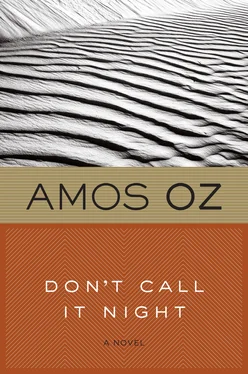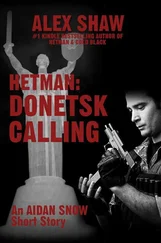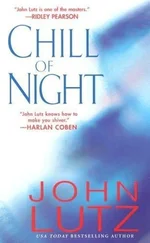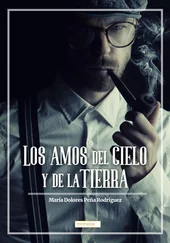Amos Oz - Don't Call It Night
Здесь есть возможность читать онлайн «Amos Oz - Don't Call It Night» весь текст электронной книги совершенно бесплатно (целиком полную версию без сокращений). В некоторых случаях можно слушать аудио, скачать через торрент в формате fb2 и присутствует краткое содержание. Год выпуска: 1997, Издательство: Mariner Books, Жанр: Современная проза, на английском языке. Описание произведения, (предисловие) а так же отзывы посетителей доступны на портале библиотеки ЛибКат.
- Название:Don't Call It Night
- Автор:
- Издательство:Mariner Books
- Жанр:
- Год:1997
- ISBN:нет данных
- Рейтинг книги:4 / 5. Голосов: 1
-
Избранное:Добавить в избранное
- Отзывы:
-
Ваша оценка:
- 80
- 1
- 2
- 3
- 4
- 5
Don't Call It Night: краткое содержание, описание и аннотация
Предлагаем к чтению аннотацию, описание, краткое содержание или предисловие (зависит от того, что написал сам автор книги «Don't Call It Night»). Если вы не нашли необходимую информацию о книге — напишите в комментариях, мы постараемся отыскать её.
Notable Book of the Year
“A rich symphony of humanity. . If Oz’s eye for detail is enviable, it is his magnanimity which raises him to the first rank of world authors.” —
(UK)
At Tel-Kedar, a settlement in the Negev desert, the longtime love affair between Theo, a sixty-year-old civil engineer, and Noa, a young schoolteacher, is slowly disintegrating. When a pupil dies under difficult circumstances, the couple and the entire town are thrown into turmoil. Amos Oz explores with brilliant insight the possibilities — and limits — of love and tolerance.
“Vivid, convincing, and haunting.” —
Don't Call It Night — читать онлайн бесплатно полную книгу (весь текст) целиком
Ниже представлен текст книги, разбитый по страницам. Система сохранения места последней прочитанной страницы, позволяет с удобством читать онлайн бесплатно книгу «Don't Call It Night», без необходимости каждый раз заново искать на чём Вы остановились. Поставьте закладку, и сможете в любой момент перейти на страницу, на которой закончили чтение.
Интервал:
Закладка:
I drove back from Beersheba to Tel Kedar in the wide old Chevrolet like a terrorist, hooting madly as I passed, cutting corners, all tense inside, seething with a cold rage that beat with a pulse of triumph. As if I'd already had my revenge. Drive straight to Muki Peleg's instead of going home, sit down with crossed knees on his low bed, a record, dim lights, shoes, a glass of wine, blouse, bra, without desire or any feeling except a destructive throbbing. Lips, shoulders, breast, then gradually southwards, by the book, twenty minutes more or less, without any passion on his part either, just collecting points in a catalogue of achievements that will never be full. Afterwards I'll have to hand him his points — sweetheart, how was I, you were great, sensational — and have for myself the satisfaction of getting the better of old "Gleam in Your Eye". I'll have a shower at his place and while I'm buttoning up my blouse he won't be able to resist asking me again, how was it, and I'll reply with Benizri's favourite phrase, Insignificant, thanks. I'll start the car and drive home with my terrorist rage defused. I'll say to Theo that tonight I'm doing the cooking. No reason. Just because I feel like it. With a white tablecloth and wine. In honour of what? In honour of Noa, who has decided to reconsider and climb down. In honour of her belated return to her natural dimensions. And tonight there'll be no jackal padding in the hall and no BBC from London. Tonight I'll put him to bed in my bed and I'll settle myself in his lookout post on the balcony. My turn now to sit facing the dark. In the morning, before going off to teach the poetry of Bialik, I'll write to Avraham Orvieto and tell him to find another sucker. Ezra Zussman's posthumous poems are entitled Footprints Lost in the Sand —they finally found me the book in the University Library in Beersheba — and on [>] I came across a poem that I liked the first half of. Instead of creating refuges I'll volunteer to collect warm winter clothing for immigrants. Or gift parcels for soldiers. I'll find some minor good cause within the limits of my ability, without biting off more than I can chew. Maybe I'll take it upon myself to edit a memorial volume for Immanuel Orvieto on behalf of the school, try to collect some material, though it'll probably turn out that no one has anything to say because who actually knew him — not even his class teacher or his counsellor.
I find it pathetic the way good people tend to volunteer to do good things for sentimental reasons. The right way is to serve the Good like that overworked middle-aged policeman, with an undistinguished round face and a small pot belly, whom I saw at the Ashkelon junction crawling on all fours to help the injured people trapped in an overturned truck while they waited for the ambulance to arrive. It was several years ago but I remember every detail: he was lying on the ground, giving the kiss of life to an unconscious woman through the crushed door. But the moment the rescue team arrived on the scene and a doctor or paramedic crawled up and took over, the policeman stood up, turned his back — there was nothing he could do now to help the injured so he set to work getting the traffic moving again: That's right, straight ahead, miss, keep moving please, the show's over.
Drily. Gruffly even. In a smoke-roughened voice. Oblivious of his mud-caked hair, his flattened cap and the rivulet of grimy blood trickling from his nose. He had sweat patches at his armpits and dusty sweat running down his face. Several years have passed, but I have not forgotten that peculiar combination of gruffness and grace. It is still my ambition to serve the Good in the way I learned from that policeman: not with gushing emotion but with supreme precision. With that air of just doing a job that verges on callousness. Confidently. Surgically. "And where are we meant to be shining, and by whom is our shining required," as Ezra Zussman wrote in the opening poem of his collection.
By the time I reached the traffic lights in the centre of Tel Kedar the poem and the policeman had helped me to get over my humiliation and dispense with revenge. Muki Peleg must find himself someone else. He would have to make do with Linda Danino. What would it achieve if yet another humiliated woman offered herself, between seven o'clock and twenty past, on a hot, damp evening in a small town in the desert, to the music of Ravel's Bolero, on a bed still covered with its dusty counterpane, to a boastful, rather shabby lecher, drenched in loud aftershave, so as to punish a man who meant her no harm and who would never discover what she had done? What good would it do? What benefit would it bring her?
None at all. Insignificant.
Muki Peleg once said to me, after his usual perfunctory spate of compliments and endearments, that actually he rather likes the pair of us. Theo and me. Not likes: admires. That's not it either. He never quite manages to say what he really means.
That's his problem. Over the years, he said, Theo and I had come to resemble each other in some indefinable way. Not in our characters, or outward appearance, or gestures, but something else, if I could only understand what he was getting at. You often notice that a sort of resemblance gradually appears in a couple who can't have children. Never mind. Forget it. He'd put his foot in it again. And I was blushing, all because of him, prattling on without sense or sensitivity. Sorry. He always ended up saying the opposite of what he meant. Similar vibes, maybe. No. What the hell. That wasn't it either.
I drove slowly past Muki's office, estate agents and investment consultants, did a U-turn at the lights and returned towards President Ben Zvi Avenue. I stopped there for a moment, trying to remember what I hid forgotten, and made up my mind that Noa was not going to climb down after all but would continue working to set up the Immanuel Orvieto Remedial Centre. At least until someone better qualified turned up who was willing to take over from her. That's right, straight ahead, miss, keep moving please, the show's over.
I did, however, park the battered great Chevrolet outside the supermarket. I bought various cold meats and salads, wine, an avocado, an aubergine, some spicy olives, and four kinds of cheese: the sin may have been called off but the ceremony of atonement was on. I found Theo sitting in the living room, his feet bare on the white rug, dressed in undershirt and tracksuit bottoms. He was neither reading nor watching television. Perhaps, like yesterday and the day before, he was dozing with his eyes open. After taking a shower I put on a flowery skirt, a blue summer blouse and a scarf. I unplugged the phone, even though I still had to sort out one thing I hadn't managed to remember to do. I forbade Theo to help me get supper ready, and when he asked what the occasion was I laughed and answered: Gleam in Your Eye.
He sat down at the kitchen table and while I sliced and warmed and poured he carefully folded green paper napkins and fed them into the special holder. In any physical activity, even something as simple as opening an envelope or putting the needle on a record, I observe a sort of precise manual dexterity that he may have inherited from generations of clockmakers, butchers, fiddlers and scribes. Though he once told me that his maternal grandfather was actually the last of a long line of gravediggers in some Ukrainian shtetl. He worked for thirty-two years as a planner, most of the time as a senior planner, in the Development Agency, They say he invented some new concepts, that he led some campaigns, some claim he left his mark. When I met him in Venezuela he was already detached, almost cold. He never wanted to talk about the conflict, the defeat, the collision with the Minister, things I learned about from vague snatches of rumours, dismissal, maybe an intrigue, followed by transfer to a dead-end department. Whenever I tried to ask, he took cover behind remarks like, My time there had come to an end, or, I'd already given them everything I had to give. That was all. About his present work he did not speak. Nor did he want me to meet his acquaintances from back then. When I first suggested that we go to live in Tel Kedar he agreed after a couple of days. When I found a teaching job in the secondary school, he opened a small office called Planning Ltd. Within a few months he had severed his links with his old acquaintances like someone opting for a deep retreat. In any case, he said, in a few years he would be due for his pension. Some evenings he goes to the California Café for an hour or two, and sits in a corner near the window overlooking the square, reading Ma'ariv or playing chess with Dubi Weitzman. But most days he gets home from the office at ten past five and stays in till the following morning. As though he is turning his back on something. He has gradually sunk into a perpetual hibernation, winter and summer alike, if one can use the word "hibernation" about a man who suffers from insomnia.
Читать дальшеИнтервал:
Закладка:
Похожие книги на «Don't Call It Night»
Представляем Вашему вниманию похожие книги на «Don't Call It Night» списком для выбора. Мы отобрали схожую по названию и смыслу литературу в надежде предоставить читателям больше вариантов отыскать новые, интересные, ещё непрочитанные произведения.
Обсуждение, отзывы о книге «Don't Call It Night» и просто собственные мнения читателей. Оставьте ваши комментарии, напишите, что Вы думаете о произведении, его смысле или главных героях. Укажите что конкретно понравилось, а что нет, и почему Вы так считаете.












